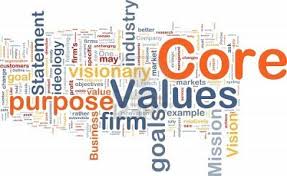One of my favourite authors is Stephen Covey. He is the master when it comes to helping you identify your values and live your life from that perspective. It makes sense, but sadly, most people or businesses don’t operate from this standpoint.
From an organizational and individual perspective, having a clear direction is the cornerstone of success. For organizations, using a values-based approach can develop (or re-develop) a vision for their future, that can be embraced by the entire organization. For individuals, understanding your values and getting clarity on your life’s goals will not only help you with your decision-making process but your choices will then be based on what’s important to you.
Using a values-based approach can also help to define your leadership abilities. According to Stephen Covey, here are some benefits both individuals and organizations can achieve by using a values-based approach to leadership development.
- Creates a Sense of Purpose – When people have a different sense of purpose and values, every decision that is made is then governed by those. In organizations, this is one of the fundamental causes of misalignment, low trust, interpersonal conflict, interdepartmental rivalry, people operating on personal agendas, etc. Even in times of change (i.e. technological advances, mergers, downsizing, etc.) the culture of the organization, when based on high trust, values and principles at its core – gives a sense of stability.
- Increased Self-Awareness – Self-awareness is the key to being an effective leader however most people realize they are not as effective as they could be and don’t change their behaviours unless a crisis occurs. Best way to avoid this is to instill a culture of growth and trust by providing people with the opportunity to have feedback from a 360-degree approach. This feedback could be formal or informal and should also provide the opportunity for coaching so they can start to realize the consequences of their ineffective behaviours and be humble enough to adopt new, more effective ways of doing things in a supportive, caring and trusting environment.
- Begin with the End in Mind – This is a famous quote by Stephen Covey and suggests that you go into an organization with the intention of creating a flexible culture of high trust so that no matter what comes along, you are going to do whatever it takes to accommodate that new change or that new reality and maintain a culture of high performance and high trust. The values and overall purpose don’t change, rather specific strategies or programs are implemented or changed to accommodate the changing realities.
- Maintain a Culture of High Performance and Trust – It’s not just about having trustworthy people. Most problems that occur are not personal, they are systemic, which is why you need to work on structure, systems and processes to make sure that they institutionalize principle-centred values. These include:
- Listen. This is crucial. We don’t really listen but rather project our own value system onto others, thinking we know what they want. When we listen from within our own frame of reference we are really preparing our reply rather than seeking to understand.
- Be empathetic.
- Make and keep your promises.
- Treat people with kindness and courtesy.
- Be completely honest and open.
- Live up to your commitments.
- Don’t betray people behind their back. i.e. don’t talk badly about them behind their back and then sweet-talk them to their face.
- Learn to apologize when you make mistakes and to admit mistakes. Take responsibility for your actions.
- Get feedback from every direction as much as possible.
Ultimately, knowing your values helps you in all aspects of your personal and professional life. I like to think of values as a compass. They provide you with direction even in times of change and uncertainty. If you find yourself stuck, lacking clarity or in conflict, chances are one or more of your values are not being met.

